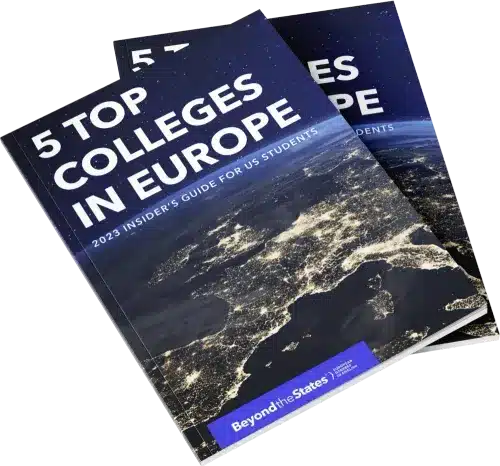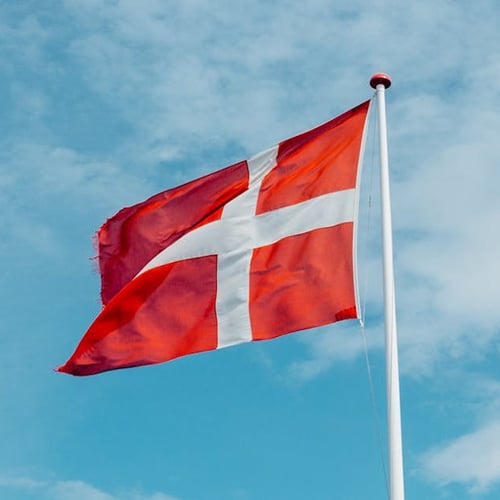Erasmus Program: Study Abroad in Multiple Countries
In another blog, we talked about the importance of global citizenship and the role international exposure plays in that development. We discussed the financial challenges the US study abroad programs present as well as the fact that some of these programs even limit integration with non-US students. Prior to the pandemic, less than 10% of US college students study abroad. In contrast, study abroad is an integral part of being a full-time student in Europe. The EU sees study abroad as aligned with their policy agendas for growth, jobs, equality, and social inclusion. Further, the EU has set a goal that all citizens should have the opportunity to acquire at least two languages, something that the European study abroad programs also foster.
FREE INSIDER’S GUIDE

Top 5 English-Taught Colleges in Europe
Kickstart you education abroad with a powerful degree taught entirely in English, all without taking on any student loans!
The Benefits of International Exposure
They note that this international exposure leads to “improved learning performance; enhanced employability and improved career prospects; increased self-empowerment and self-esteem; improved foreign language competencies; enhanced intercultural awareness; more active participation in society”. These are exactly the reasons we think studying in Europe is important as well!
Unlike the US university system, which views studying abroad as an opportunity to generate high fees from unwitting students, the European study abroad program is promoted by the EU who puts money INTO encouraging students to study outside their home country. This is one reason why the number of English-conducted programs has increased over the past couple of decades. Having these programs taught in English encourages European study abroad.
The Erasmus Program
The EU has a program called Erasmus+. This is an umbrella organization that encompasses many programs that encourage mobility among young people. The student mobility program is one that all degree students at participating European universities can participate in, even international students!
So, if you are a student at a European university that participates with Erasmus, (and most do) you have the opportunity to spend up to twelve months of your program on a European study abroad (and sometimes outside of Europe as well). This can be studying at another university or doing an internship in another country or a combination of the two. You can use the twelve months for each level of study (meaning you can participate during your bachelor’s degree program and then again during your master’s program).
There are logistical benefits to the Erasmus program, for instance, you are assured that your credits will transfer, there are structures in place to assist with housing and student life, and all internships have a written agreement that includes a clear focus and specific project that will offer the student exposure to an occupation, industry or field (no fetching coffee). I recently worked with a student who really wants to study in Spain, but there were not a lot of English conducted full degree programs in her area of interest. She decided that she would be fine spending one of the three years of her program in Spain, so will apply to schools in other European countries with the plan to study in Spain through Erasmus.
There is also a financial benefit to European study abroad. Students on Erasmus continue paying the tuition of their main school, even if the tuition at the university they are visiting is more expensive. Think of Jared, who was only paying $1,000 tuition per year at KU Leuven. Almost any other school would have a much greater tuition, but he would continue to pay the KU Leuven rate while studying elsewhere through the Erasmus program. Further, students can apply for an Erasmus grant which provides monthly stipends of 150-500€ per month depending on the cost of living of the country. Here’s the other great thing – students can do the internship (with the grant) the year after they graduate so long as they complete the application and selection process during their final year of studies. Given that employers hire 50-75% of former interns, this is a fantastic opportunity to get a career off to a strong start.
Master’s Degree Options
You don’t hear much in the US about study abroad opportunities in master’s degree programs. In Europe, not only is the student mobility program open to master’s degree students in Europe (again, even international students) there is also the Erasmus Mundus program. These are really interesting and often integrated programs that are developed and implemented by a consortium of higher education institutions in at least two different countries. Students study in at least two countries and receive a joint degree from the universities of the consortium. There are many of these programs that are conducted entirely in English. There are options for just about every field of study that you can think of: Agriculture, Arts, Design, Humanities, Social Sciences, Health Sciences, Computer Science and Technology, Business, and more. These programs are relevant to today’s issues and often involve professionals from related companies which helps students understand how to apply the knowledge – not to mention network!
Some examples of the programs are:
Journalism, Media, & Globalization
Study in Denmark, the Netherlands, UK, Germany
This program provides “a unique educational experience with students studying and living in at least two European countries. The first year of the degree is spent in Denmark with the entire cohort, and the second year sees students split into smaller groups and move universities to specialize in one of four distinct areas of journalism: War and Conflict, Business and Finance, Media and Politics, or Journalism and Media Across Cultures. Students learn to combine academic, theoretical knowledge with journalistic skills, and to analyze, interpret and generate knowledge about the global changes that increasingly challenge traditional boundaries.”
Food Innovation & Product Design
Study in Belgium, Portugal, Germany
This program helps “foster innovation and technology in order to cope with the future needs and sustainability in food science, technology, and business? The aim of the program: To foster and develop knowledge and awareness of scientific trends and health issues in food science, technology, and business in a global context. In addition, the course seeks to enhance student’s professional competence in areas such as safety, management, and ethics.”
Strategize the Path to College in Europe
We’ve set aside some time this week for one of our admissions experts to help
serious applicants with some ideas. Book a FREE call today; spots are limited!
Migration and Intercultural Relations
Study in the Czech Republic, Slovenia, Norway, Germany
They “address issues that currently rank highly on the global agenda – and need expertise on transnational, transcultural and transdisciplinary level. Migration and mobility, flight, displacement, and refugee – globally and (supra)nationally discussed primarily on a policy level – touch decisive dimensions in economic and social development, demography, international relations, political theory and cultural cooperation, to name some, not all of the key areas. Sustainable answers bridging the interests of nation states (incl. their welfare systems and labour markets) with human rights, democratic values and globality have yet to be found. Research on intercultural relations and intercultural communication is closely linked to these questions and frequently key to the understanding of problems and conflict.”
The Costs of Study Abroad
Most of these programs cost around 9,000€ per year for a two-year program, but Erasmus offers scholarships for each of the programs. These merit-based scholarships cover 100% of the tuition, 1,000€ per month for living expenses, and even money for a travel allowance (the amount is determined by how far your home country is from your study country). The scholarships are quite competitive, but most of the programs offer other scholarship options as well.
The fact that these EU-funded programs are open to international students really speaks to how highly the EU values globalization. They want students from around the world to study with them because the outcome is positive for the world as a whole and benefits Europe. If you have read our blogs, you already know that you have an incredible number of options for a high quality and affordable education in Europe-conducted entirely in English. You also have the opportunity to study in more than one foreign country without extra cost, all while gaining relevant skills and knowledge for the workforce. There are over 3,400 English conducted bachelor’s and over 8,000 master’s programs throughout continental Europe. Let Beyond the States be your guide to all the exciting educational options in Europe by becoming a member today.










